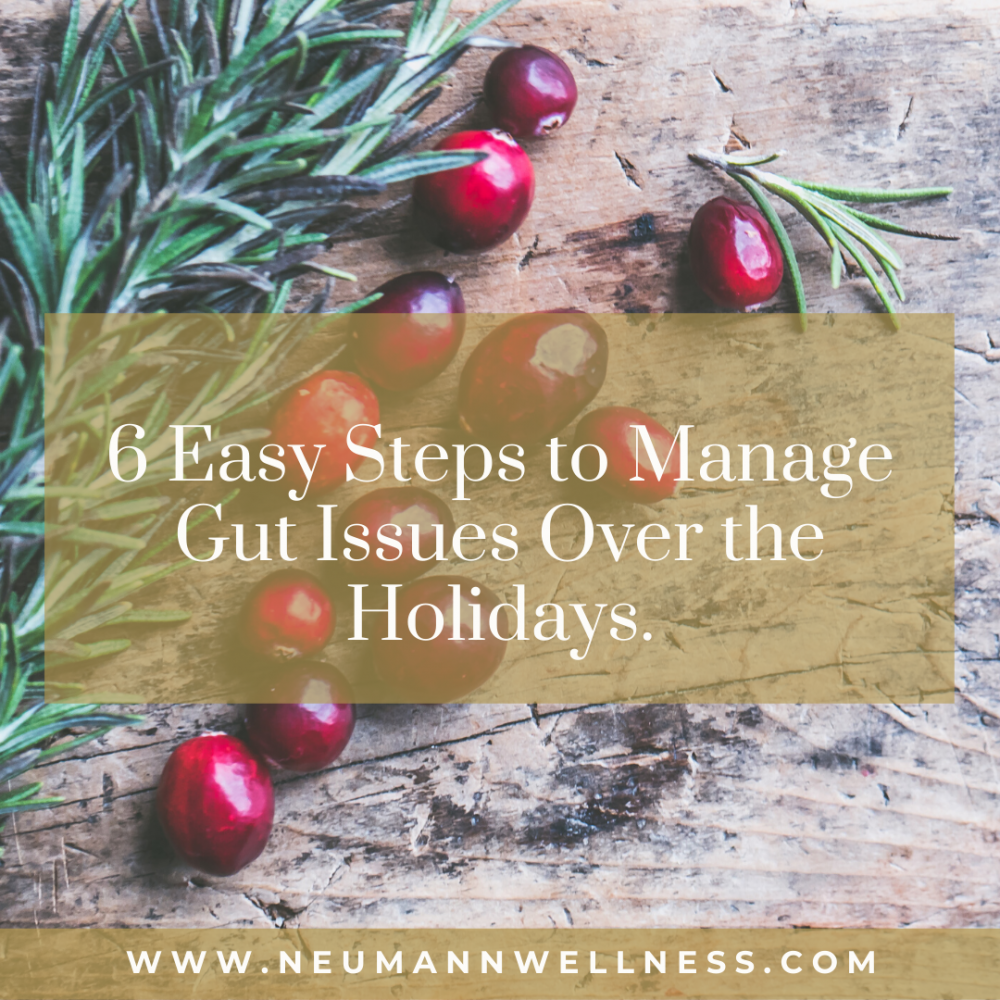
Gut Issues & Holiday Feasts: How to Survive the Madness
Let’s face it: the holidays and gut issues don’t exactly go hand-in-hand. With all the rich food and non-stop socializing, the stress can skyrocket for those of us with sensitive stomachs.
But here’s the good news—just a bit of prep can make all the difference when it comes to enjoying the season without the gut-wrenching aftermath.
In this post, I’m sharing 6 simple, no-fuss tips for keeping your digestive system in check during the holiday hustle.
Tip #1: Say No to the Grease and Yes to Your Gut’s Peace
Overloading on fatty foods can wreak havoc on your stomach, leading to things like cramps, reflux, bloating, and—let’s not forget—the dreaded diarrhea.
And you know the usual suspects: fried foods, fatty meats, creamy sauces, butter-drenched veggies, and those rich, indulgent desserts.
So how can you dodge the gut chaos? Here’s the trick:
- Opt for steamed, roasted, or baked over fried
- Ask for sauces, dressings, and gravies on the side—control your own destiny
- Savor those rich desserts in small bites (3-5 bites is the magic number)
- And, most importantly—slow down and enjoy your food, your gut will thank you
Tip #2: Keep the Coffee Low, Keep the Calm High
Caffeine is like the chaos-maker for your gut—pushing things into overdrive and often triggering that “gotta go” feeling, diarrhea, heartburn, and reflux. You’ll find it lurking in coffee, tea, chocolate, and sodas, all the usual suspects.
So, how do you keep caffeine from wrecking your day? Here’s the move:
- Go for soothing herbal teas (ginger and peppermint are gut-friendly champs)
- Sip on hot water with a fresh squeeze of lemon or a slice of ginger for a calming boost
- Cut back on those indulgent chocolate desserts and sugary hot chocolates
- Swap your regular or diet soda for some fizzy seltzer water instead
Tip #3: Keep the Drinks in Check, Skip the Drama
Ah, alcohol—the life of the party, but also the culprit behind gut chaos. Whether it’s loose stools the next day, reflux, bloating, or that uncomfortable gas, alcohol can be a serious troublemaker. You’ll find it in wine, liquor, and beer—basically, all the usual suspects.
So, what’s the strategy to keep your gut from revolting? Here’s the playbook:
- Sure, you could totally skip it (your gut will thank you)
- If you’re indulging, cap it at one drink—no need to go overboard
- Always pair it with food; your stomach isn’t a fan of drinking on an empty tank
- Opt for dry wines or clear distilled spirits—they’re gentler on the gut
- Or, go for a mocktail with low sugar and keep it classy
Tip #4: Don’t Overload on the Rough Stuff
If you’ve got gut issues, you’ve probably heard the advice to cut back on roughage. While fiber is crucial for overall health, some of us have a hard time with too much of it (and, if that’s you, it might be worth getting a stool analysis to see if there’s an imbalance in your gut that’s making fiber feel like a personal attack).
Roughage, aka insoluble fiber, is usually found in fruits and veggies with thick skins (think: potato skins, apple skins, wheat bran, and most whole grains like quinoa and bulgur). It passes through your gut mostly intact and can sometimes stir up trouble.
On the flip side, soluble fiber is much gentler on the stomach. It absorbs water and forms a gel-like substance, helping to keep things moving smoothly—perfect for managing loose stools. Think: the insides of fruits and veggies, like avocado, banana, applesauce, oats, or potatoes without the skin.
Our bodies don’t fully break down fiber; we can chew it, but that’s about it. It’s the gut microbes that come to the rescue, fermenting fiber and turning it into useful byproducts.
But too much roughage? That’s when things go south—diarrhea, bloating, gas, and abdominal pain are common complaints. High-roughage offenders include salads, raw veggies, nuts, and fruits with thick skins.
But here’s the thing: you don’t need to banish these foods completely. They’re packed with nutrients that support your gut microbes, and those microbes work to produce anti-inflammatory byproducts for your colon.
To help manage the roughage without going overboard, consider digestive enzymes with meals (products like Bean Assist by Enzymedica can help, and they’re available through my online dispensary).
Here’s how to make it work for you:
- Opt for cooked veggies and fruits—they’re easier on the gut
- Peel fruits and veggies when you can
- Choose nut butters or nut milks instead of whole nuts (they’re much gentler)
- Go for softer options like smoothies, mashed potatoes, soups, avocado, butternut squash, sweet potatoes, and bananas
Tip #5: Don’t Let Sugar Stir the Pot
Let’s be real: most of us are drowning in sugar all year long. The average American downs about 82 grams of added sugar daily, when women are actually supposed to keep it at just 25 grams a day.
Too much sugar? It’s not just a stomach irritant—it triggers inflammation in your gut and increases your risk for a laundry list of chronic diseases. Overloading on sugar in one sitting can pull water into your bowels, leading to diarrhea, and it can also bring on bloating, gas, abdominal pain, nausea, and that all-too-familiar fatigue.
So, where’s all this sugar hiding? You’ll find it in soda, sweet tea, lemonade, candy, cookies, desserts, flavored yogurts, canned cranberry sauce, cereals, and even sweetened milk substitutes (like almond, soy, or coconut milk).
To keep the sugar in check, here’s what you can do:
- Always check labels for hidden sugar sources like high fructose corn syrup (HFCS), cane sugar, sucrose, maltose, barley malt, rice syrup, etc
- Choose unsweetened yogurt and milk substitutes
- When baking, reduce the sugar by 25% (or 1/3)—trust me, it still tastes good
- Use less-refined sugars like sucanat instead of the processed stuff
- Flavor your dishes with vanilla or almond extract, cinnamon, or nutmeg instead of sugar
- Try cinnamon to flavor your coffee or tea, and ditch the sugar
- Add sweetness with dried fruit (if your gut’s okay with it), mashed bananas, applesauce, or fresh chopped fruit
- Sip on seltzer or herbal tea instead of sugary drinks
Tip #6: Chill Out While You Chow Down
Here’s the truth: how you eat is just as important as what you eat. Are you scarfing down your meal in a race against time? Done before everyone else? Take a step back and chew your food properly, savoring every bite. Your eating environment plays a big role too—so pay attention to that, because stress while eating can really mess with your gut.
Here’s how to make it less chaotic:
- Find a calm spot to eat, not your desk or your car’s steering wheel (seriously, stop doing that)
- Put down the phone, turn off the TV, and step away from your computer while you eat
- Take a moment to breathe deeply—three inhales, three exhales—before diving in
- Focus on each bite. Chew thoroughly before swallowing. Your gut will thank you
- Stop eating when you’re about two-thirds full—don’t force it
Bonus Tip: Know Your Food Triggers Like the Back of Your Hand
If you’ve got that gut feeling (pun intended) that certain foods are fueling your digestive chaos, but you’re not sure which ones, it might be time to dive into food sensitivity testing. In my practice, I combine these results with a tailored elimination diet to help my clients finally find the relief they’ve been craving.
Here’s the Best Part: I’ve Got Your Back in Finding Your Way to True Vitality
No more guessing games, no more randomly eliminating foods and hoping for a miracle.
I’m here to help you design a clear, customized path to wellness that’s built specifically for your body. We’ll pinpoint the exact foods causing your gut issues, then work together to create a plan that heals and restores balance. This isn’t a one-size-fits-all approach—it’s a solution tailored to you.
Ready to uncover the true cause of your gut inflammation and start your transformational gut healing journey? My program is custom-built and reserved only for those who’re ready to go all in. Schedule your digestive assessment with me to get started.

